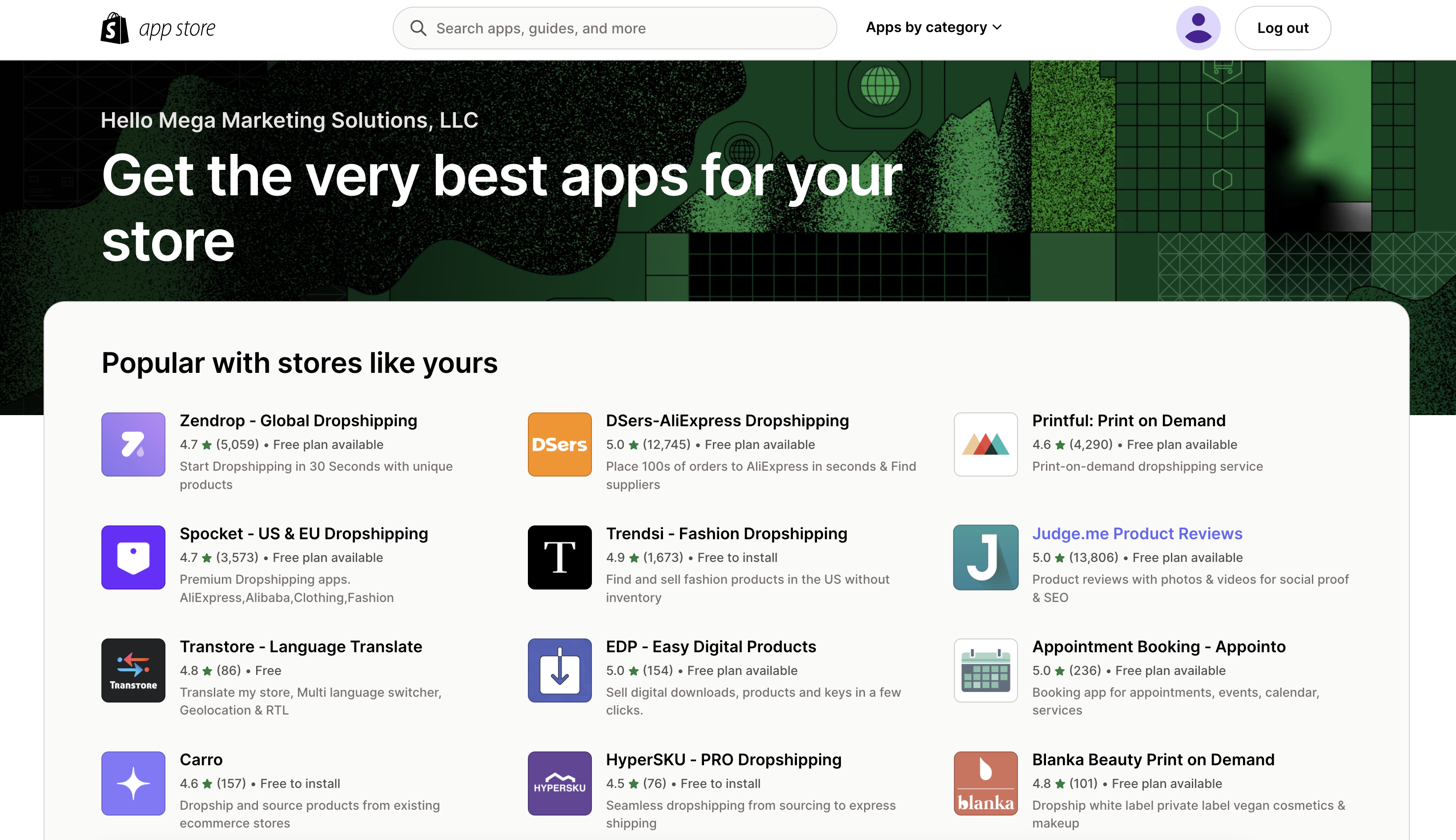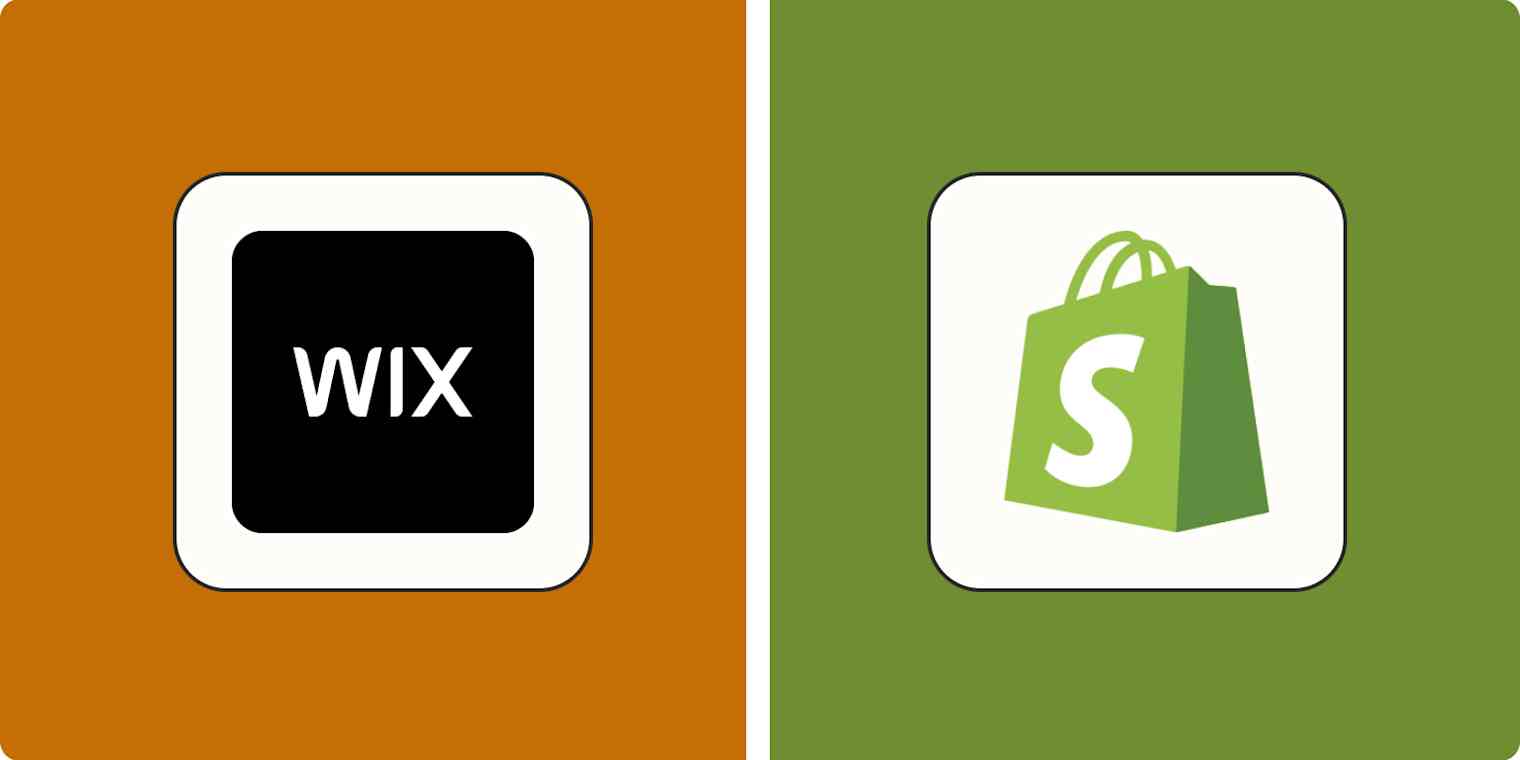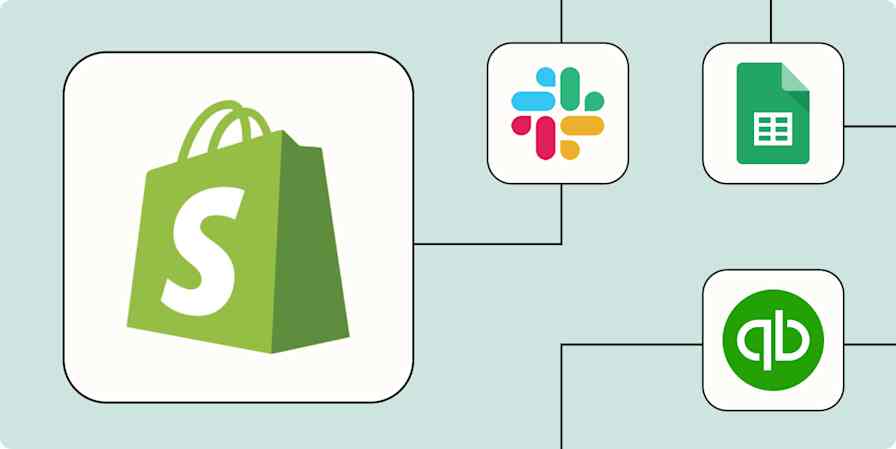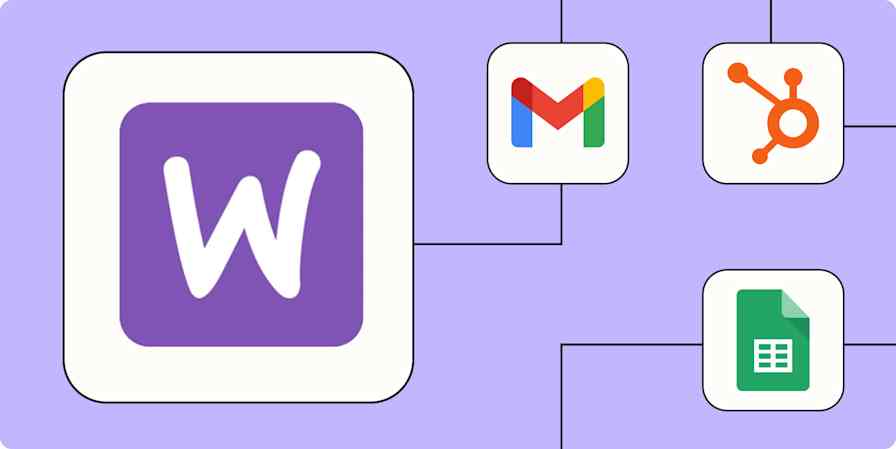In my time working as a content marketer, I've had experience working with a lot of (arguably too many) CMS platforms and website builders. While I can honestly say you'll probably be able to get the job done no matter which one you choose, it's still important to do your due diligence when making your decision.
Wix and Shopify are two website builders that are particularly popular among eCommerce businesses. So I created a fake company on each platform and dug deep into testing to compare their features and offerings. Based on that testing, here are my findings on Wix vs. Shopify.
Table of contents:
Wix vs. Shopify at a glance
When it comes down to it, you can use either Wix or Shopify to create a powerful and unique online store, but Shopify was built for eCommerce and Wix wasn't.
Wix is better for small businesses and creative bloggers who value user-friendliness and don't require advanced, scalable eCommerce tools.
Shopify is better equipped to support medium to large eCommerce businesses with a sales mentality, extensive inventory, and a multinational customer base.
| Wix | Shopify |
|---|---|---|
Ease of use | ⭐⭐⭐⭐⭐ Drag-and-drop editor; user-friendly blog interface | ⭐⭐⭐⭐ Advanced customization requires coding knowledge |
Inventory and fulfillment | ⭐⭐⭐ Fewer inventory and fulfillment features; original purpose wasn't eCommerce | ⭐⭐⭐⭐⭐ Advanced inventory features; has its own fulfillment network to carry out orders; highly eCommerce-oriented |
International focus | ⭐⭐⭐ Multilingual support; limited international shipping; POS system limited to the U.S. and Canada | ⭐⭐⭐⭐⭐ Advanced multilingual support; facilitates end-to-end multicurrency payments; advanced international shipping |
Blogging | ⭐⭐⭐⭐⭐ Easily create an aesthetically pleasing blog; easy access to Semrush keywords | ⭐⭐⭐⭐ Blogging is doable but isn't its core focus; offers fewer advanced features |
Marketing features | ⭐⭐⭐⭐⭐ Built-in email and ad marketing for paid users; advanced SEO is user-friendly | ⭐⭐⭐⭐ Built-in email and ad marketing with option to upgrade with integrations; advanced SEO requires some technical knowledge |
Cost | ⭐⭐⭐⭐⭐ 14-day free trial; plans don't get as expensive as Shopify's Light: $17/month Core: $29/month Business: $36/month Business Elite: $159/month
| ⭐⭐⭐⭐ 3-day free trial; pay $1/month for first 3 months; transaction fee goes down as you upgrade your plan
Starter: $5/month Basic: $29/month Shopify: $79/month Advanced: $299/month Shopify Plus: Starts at $2,300/month |
Integrations | ⭐⭐⭐⭐⭐ Has 800+ integrations; integrates with Zapier | ⭐⭐⭐⭐⭐ Has 8,000+ eCommerce integrations; integrates with Zapier |
POS system | ⭐⭐⭐ Can only be used in the U.S. and Canada for specific types of businesses; POS hardware is expensive | ⭐⭐⭐⭐⭐ Can be used in any country POS Lite: free with any Shopify plan POS Starter: $5/month POS Pro: $89/month or free with Shopify Plus
|
AI features | ⭐⭐⭐⭐⭐ Full website builder; multiple content generators; free AI assistant; SEO AI tools | ⭐⭐⭐⭐ Product description and image background generators; fewer creative features; free AI assistant |
Customer support | ⭐⭐⭐⭐ Phone support during business hours; 24/7 chat support; email support; online forum support | ⭐⭐⭐⭐⭐ 24/7 support via phone, chat, and email; online forum support |
Shopify is hands-down the more scalable eCommerce solution
When it comes to scaling for eCommerce, Shopify doesn't play around. The platform is first and foremost optimized for online selling. That means, if you're willing to spring for a premium plan, you'll get way more eCommerce functionality with Shopify. Let's break it down.
Shipping and inventory management
Shopify's shipping and fulfillment benefits are unmatched. Not many website builders and CMSes can boast owning their own fulfillment network, but Shopify can.
Assuming your business and product offerings meet certain eligibility criteria, Shopify will take care of fulfillment and returns. If you're a decently sized business with a lot of orders to fulfill, you can say goodbye to a pretty massive headache.
Wix also offers shipping and fulfillment assistance, but if you want to process a large volume of orders, you'll need to integrate with third-party logistics providers like ShipBob, Shippo, or ShipStation, among others. These third-party logistics integrations can help automatically manage inventory, print shipping labels, and track shipments, just not natively in Wix.
Shopify also partners with several carriers to offer shipping discounts up to 88%, which tend to increase as you upgrade your plan.

When it comes to inventory management, Shopify gives you a high level of control over an unlimited number of products. With Wix, you'll be limited to 50,000 products. Both platforms restrict how many product variants and options you can add to your store (three options and 100 variants for Shopify and six options and 1,000 variants for Wix).
App marketplaces
Shopify also offers over 8,000 eCommerce-specific integrations—including everything from bigger names like Klaviyo and TikTok to more niche solutions like Spocket and Judge.me—to help facilitate functions like international dropshipping, inventory management, and even customer retention.

Meanwhile, Wix offers 800+ integrations—a fraction of those offered by Shopify. Why the discrepancy? Since Shopify positions itself as the more eCommerce-oriented solution, significantly more stores use it, making it more profitable for app developers to create apps compatible with Shopify.
Still, it's worth noting that Wix offers more in-house integrations (50+ mini-apps exclusive to the Wix CMS) than Shopify and that not every Wix integration is eCommerce-centric. Popular third-party Wix apps include Google Analytics, Google Ads, HubSpot, and Mailchimp.
While Shopify offers more integrations than Wix, both Shopify and Wix integrate with Zapier. So whichever platform you choose, you can integrate it with the rest of your favorite apps, automating your workflows and keeping your business running smoothly. Learn more about how to automate Shopify and how to automate Wix, or get started with one of these pre-built templates.
Add new Shopify customers to Google Ads Custom Lists
Add or update Mailchimp subscribers when a new Wix Form is submitted
Create HubSpot contacts when a new Wix Form is submitted
Zapier is a no-code automation tool that lets you connect your apps into automated workflows, so that every person and every business can move forward at growth speed. Learn more about how it works.
Ultimately, if you're an eCommerce business with a large inventory, sell many variations of your products, and/or sell to an international customer base, Shopify is likely better equipped to meet your needs.
Customizable checkouts
When crafting the perfect online storefront, the checkout experience can make or break a sale. Wix and Shopify both offer solid platforms, but their approaches to checkout customization differ slightly—notably in that Shopify locks all its cart customization behind the expensive Shopify Plus plan.
Wix provides a streamlined, user-friendly interface, allowing small businesses to quickly add custom fields and guide customers through the purchase process with placeholder text and field descriptions. It offers a lot of customization options, including the ability to stack and bundle products and services in the same cart. For a small business, this ease of use can make a big difference.
Shopify is built to handle larger inventories and provides extensive checkout customization—but only on higher plans. Checkout Blocks, unlocked with Shopify Plus, lets you add various types of blocks to your cart, such as custom fields and dynamic content. If you're a growing business anticipating high volumes and require granular control over every aspect of the checkout process, Shopify Plus's flexibility justifies its higher cost.
Payment options
Wix Payments and Shopify Payments are pretty comparable, all things considered. Both are streamlined solutions tailored to their respective platforms. Wix Payments shines with its ease of setup, especially for existing Wix users, and its clear-cut fee structure—no transaction fees, just processing rates. But its limited geographic availability and business restrictions may pose challenges.
Shopify Payments, on the other hand, boasts broader international support and a wider array of payment options—but it does charge transaction fees. It also supports a wider range of businesses and products. (Wix has a fairly substantial list of prohibited items.)
Wix is more flexible when it comes to site design
Both Wix and Shopify make building an aesthetically pleasing website with eCommerce functionality relatively easy, but Wix goes above and beyond with its flexibility and extensive template offerings.
While Wix initially presented me with a few pages of themes designed specifically for websites in my industry (making me feel very special), I was also able to explore Wix's entire library of 800+ templates. As someone who spends 30 minutes staring at restaurant menus before choosing something, I did feel some decision fatigue. That said, I appreciated Wix's comprehensiveness—it truly has something for everyone.

Plus, all 800+ Wix themes are free. This is more than I can say about Shopify, which only offers about a dozen free themes and 230ish themes total. Most paid themes cost a one-time fee of over $150, so if you're at all price-sensitive when it comes to web design, you may score Wix higher.

That said, Shopify's themes are all fully responsive, meaning they're already optimized for both desktop and mobile. When switching to a mobile view, Shopify adjusts the page, so elements still look great.

Meanwhile, you may have to optimize Wix's mobile layout yourself by adjusting individual elements. It can get pretty tedious if you have any advanced features on your page, but I did find Wix's mobile setup tool very user-friendly when customizing the basics, like headers and navigation menus.

After using Shopify's blocky, rigid theme customizer for a couple of my clients, I felt like a butterfly emerging from a cocoon when playing around with Wix's flexible drag-and-drop editor. In Wix, you can add elements like text, images, buttons, boxes, and more anywhere on the page by just dragging and dropping it where you want it.

While some may like the structure of Shopify's section-by-section block editor, I'm personally a huge fan of the flexibility Wix offers to those who want to give their site a creative spin.
The better platform for marketing depends on your audience and initiatives
Both Wix and Shopify offer excellent automated marketing campaign tools, so you'll need to decide which features matter most to you.
Email marketing
When it comes to email, these two platforms are pretty similar. Both provide key marketing features like automated abandoned cart recovery, customer winback, and post-purchase upsell emails, with more available through third-party integrations.
Wix's free plan allows for 200 newsletter subscribers per month; paid plans range from $120/month for 500 emails to $549/month for 1 million emails.
Shopify provides 10,000 free emails per month; additional emails cost $1 per 1,000. This functionality can be expanded with third-party integrations like Omnisend.
Each app also has its own built-in marketing email templates to give you a running start. Here are a few of Wix's options:

And here are Shopify's:

SEO
If your marketing efforts are SEO-focused, each platform has its own unique pros and cons. Generally speaking, blogging is Wix's specialty. Not only is its blogging interface user-friendly and powerful, but it also offers built-in SEO tools.
For example, it allows you to add three related posts for each article by hand. This is especially helpful for delivering content that your readers really want to see, lowering bounce rate.

Both Wix and Shopify make it easy to adjust SEO basics within blog posts, like URL, title tag, and meta description. But Wix's partnership with Semrush allows you to view Semrush keyword data from your dashboard. Plus, it unifies all of your sitewide SEO tools under one tab to keep things user-friendly—a feature Shopify lacks.

One particular area of SEO where Shopify struggles is URL structure. While Wix has added a URL customization capability, Shopify still adds their own unnecessary elements to product page URLs, which cannot be removed, like "/collections/" or "/products/". Shopify also forces blogs into categories with a "/blogs/CATEGORY/keyword" structure. This hinders SEO performance, as it's best practice to keep a post's target keyword as early in the URL as possible.
While both platforms offer multilingual site options, only Shopify will automatically translate the end of your URL to the user's language. For example, Wix will leave a product page URL slug as "/pretty-flowers/" on the Spanish version of the site (although you do have the option to adjust this manually), whereas Shopify will translate it to "/flores-bonitas/". If you cater to an international audience, Shopify's SEO features may win out over Wix's.
Wix offers more in-depth AI tools
When it comes to AI, Wix and Shopify take different approaches—that reflect the strengths of each platform. Wix leverages AI to streamline website creation and design (its core focus), while Shopify focuses on improving your eCommerce operations (its core focus).
With Wix, AI features come into play before you even start building your website. First, you'll interact with a chat-based system, Wix ADI, that gathers information about your business, goals, and desired brand image. This allows it to generate a complete website with custom layouts, images, and content tailored to your needs.

From here, Wix will walk you through site setup steps based on the AI's recommendations. (Of course, you can always change or skip these steps if they aren't quite right.)
When it comes to design, you can choose to begin with a template or have a site made for you in seconds (literally) by Wix's AI website builder. It's an impressive feature, creating a functional, fully customizable site almost instantly—which is why it tops Zapier's list of the best AI website builders. Just don't expect too many bells and whistles.

If you choose to go the bespoke route or work from a template, Wix's other AI tools—like text and image generators, image auto-enhancement, alternative layout suggestions, and auto background removal—will help simplify the process.
Wix also incorporates AI into marketing and SEO. The AI meta tag creator generates title tags and meta descriptions to improve search engine visibility in a fraction of the time it would take to generate them manually. Wix also handily provides AI tools for generating social media captions and Google Ads content, leveraging AI to streamline the most boring parts of your marketing efforts. (Note: SEO assistant is only available for users subscribed to one of Wix's paid plans.)
Shopify's AI, primarily through the Shopify Magic suite, concentrates on enhancing eCommerce functionality. It doesn't offer a full AI website builder like Wix but instead provides AI tools to optimize existing online stores.
You can use Shopify Magic AI to generate product descriptions, product image backgrounds, FAQ answers, and email timing suggestions, and even convert live chat to checkout. (For example, if the customer expresses buying intent, the AI can pre-fill checkout fields based on the conversion.) The product description AI tool is especially handy—just input a product title and a few keywords, and Shopify will handle the rest. At scale, this can make a huge difference.

Shopify's AI tools are less in-your-face than Wix's, so keep an eye out for the Shopify Magic AI icon (two little stars) as you navigate the site editor.
Shopify also offers Sidekick, an AI assistant that functions as a business advisor, content generator, and how-to resource all in one. Sidekick assists with store management, generates custom reports on key metrics like bestselling or underperforming products, and acts as a commerce advisor.
At the end of the day, if you're starting from scratch and need robust AI assistance in creating and designing a website, Wix is the stronger option. But if you know you'll be setting up an advanced eCommerce shop, you may need Shopify's eCommerce capabilities more than an AI-powered design buddy.
Which is cheaper: Shopify or Wix?
| Wix | Shopify |
|---|---|---|
Free plan | Available (with ads) | Not available |
Entry-level | $17/month (Light) | $29/month (Basic) |
eCommerce | $29/month or $36 $29/month (Core or Business) | $79/month (Shopify) |
Advanced | $159/month (Business Elite) | $299/month (Advanced) $2,300/year (Shopify Plus) |
Transaction fees | 2.9% + $0.30 per transaction | 2.9% + $0.30 per transaction (additional discounts available to higher plans) |
Each option's basic plans are priced comparably at under $30 per month (if you pay annually), but you'll pay significantly more for Shopify Advanced at $299 per month (if you pay annually) than for Wix Business Elite at $159 per month.
Keep in mind, though, that Shopify offers a 25% discount on its plans when you pay annually, whereas Wix offers no annual discounts. Shopify also reduces the percentage of each sale it takes as you upgrade your plan, which Wix doesn't do.
Speaking of transaction fees, both Shopify and Wix charge processing fees on every order, and the amount can change depending on customer location and payment method. For Shopify, most online domestic transactions have a fee of 2.9% of purchases plus $0.30 cents. More expensive plans have reduced rates.
Wix's fees are comparable, at 2.9% plus $0.30 within the U.S., but this rate stays the same even if you subscribe to a higher-tier Wix plan. As with Shopify, the fee will be higher for certain credit cards (like American Express) and payment locations.
Shopify vs. Wix: Which should you choose?
Here's the bottom line: If I were making a creative blog and wanted to do some selling on the side, I'd choose Wix. If I were building a website for eCommerce purposes for my medium to large business, I'd choose Shopify.
That's not to say Wix isn't equipped for eCommerce or that Shopify doesn't have the tools needed to design a creative blog—rather, these aren't each platform's greatest strengths. Consider each platform's reputation in tandem with your business's size, financial limitations, and needs to make your decision.
Shopify vs. Wix FAQ
Choosing a website builder is a major decision. After all, nobody wants to go through the hassle of migrating their whole site to a new CMS. Refer to the common questions about Wix and Shopify below as you decide which platform is right for you.
Is Wix better than Shopify?
Wix is arguably better than Shopify in some areas, such as flexibility and quantity of free template offerings, but it falls behind Shopify from an eCommerce perspective.
Which is better for SEO: Shopify or Wix?
Both Shopify and Wix have their pros and cons when it comes to SEO. Shopify is better for multilingual SEO, but Wix provides better keyword assistance, AI tools, and more user-friendly access to sitewide SEO.
Don't let choosing between Wix and Shopify keep you up at night. Just be mindful of your business's primary goals, and choose whichever eCommerce platform caters to them best.
What can Shopify do that Wix can't?
While Wix and Shopify are each great tools for building online stores, Shopify is fundamentally built as an eCommerce-first platform. Broadly speaking, Shopify has a more comprehensive set of tools specifically designed for selling products online—which Wix, primarily a website builder with eCommerce sprinkles on top, doesn't quite match.
Should I switch from Wix to Shopify?
If you're deep in the eCommerce trenches and need a more robust tool to support the volume of your growing operation, then a switch might be a good idea, yes. But if eCommerce is only part of your hustle, Wix is generally considered one of the best website builders around.
Can Wix handle eCommerce?
The short answer is yes. Wix can handle eCommerce by allowing users to set up online stores, create product pages, and manage eCommerce features. Wix's eCommerce capabilities and dedicated AI tools for online selling aren't as extensive or specialized as those Shopify offers, but they're cheaper and arguably more accessible for new shop owners.
Related reading:
This article was originally published in March 2023. The most recent update, with contributions from Dylan Reber and Abigail Sims, was in April 2025.










